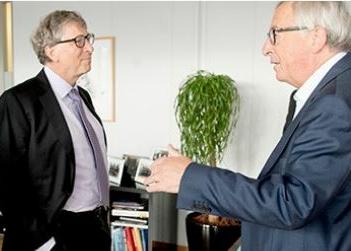
BRUSSELS, Belgium, October 19, 2018 (ENS) – Microsoft co-founder Bill Gates knows that €100 million can fund a lot of climate-friendly, clean energy research by European innovators, so as founding chairman of a new investment fund, Breakthrough Energy Ventures, Gates is collaborating with the European Commission to provide that support.
Under Gates’ leadership, Breakthrough Energy and the European Commission Wednesday signed a Memorandum of Understanding to establish Breakthrough Energy Europe (BEE), a joint investment fund to help innovative European companies develop and bring “radically new clean energy technologies” to market.
Breakthrough Energy Europe links public funding with long-term risk capital so that clean energy research and innovation can be brought to market more quickly and efficiently.
With a capitalization of €100 million (US$115.2 million), the fund will focus on reducing greenhouse gas emissions and promoting energy efficiency in the areas of electricity, transport, agriculture, manufacturing, and buildings.

Gates said in Brussels, where he met with European Commission President Jean-Claude Juncker, “We need new technologies to avoid the worst impacts of climate change. Europe has demonstrated valuable leadership by making impressive investments in R&D.”
“The scientists and entrepreneurs who are developing innovations to address climate change need capital to build companies that can deliver those innovations to the global market,” said Gates. “Breakthrough Energy Europe is designed to provide that capital.”
Breakthrough Energy Europe is expected to be operational in 2019. Half the equity will come from Breakthrough Energy and the other half from InnovFin, risk-sharing financial instruments funded through Horizon 2020, the EU’s current research and innovation program.
InnovFin, EU Finance for Innovators, is a joint financing initiative launched by the European Investment Bank Group with the European Commission under Horizon 2020.
The agreement signed Wednesday supports the Commission’s desire to lead the fight against climate change and to deliver on the Paris Agreement, giving a strong signal to capital markets and investors that the global transition to a modern, clean economy is here to stay.
President Juncker said, “Europe must continue to take the lead in tackling climate change head on, at home and across the world. We must push for the modernisation of Europe’s economy and industry in order to meet the ambitious targets put in place to protect our planet.”
“Pooling public and private investment in new, innovative clean energy technology is key to enabling long-term solutions to reduce greenhouse gas emissions,” said Juncker. “If Europe is to have a future that can guarantee the well-being of all its citizens, it will need to be climate-friendly and sustainable.”
The EU now gets more than 30 percent of its electricity from renewable sources, up from 12 percent in 2000. At the current rate of growth, the European bloc can increase the proportion of renewables in its electricity mix to 50 percent by 2030, according to a new report published by think tanks Sandbag and Agora Energiewende.

The EU views itself as playing a decisive role in building the coalition of ambition making the adoption of the Paris Agreement possible in December 2015. is a global leader on climate action.
The Commission has already brought forward all legislative proposals to deliver on the EU’s commitment to reduce emissions in the European Union by at least 40 percent by 2030.
Maroš Šefčovič, vice-president of the Commission for the Energy Union, said, “The scale and speed of what is needed to reach our climate goals require innovative thinking and bold action. Not only is this new public-private investment vehicle being set up in record time, it will also serve as an example of us joining forces to accelerate breakthrough innovation in Europe.”
Beyond updating and strengthening its energy and climate legislation, the EU is developing enabling measures that will stimulate investment, create jobs, empower and modernize industries.
The Commission is currently working on a long-term strategy for the reduction of greenhouse gases. The proposal will be published in November, ahead of the UN’s annual climate summit in Katowice, Poland.
Carlos Moedas, commissioner for research, science and innovation, observed, “We are delivering on our commitment to stimulate public-private cooperation in financing clean energy innovation. The €100 million fund will target EU innovators and companies with the potential to achieve significant and lasting reductions in greenhouse gas emissions.”
On the margins of the COP21 climate conference in Paris in 2015, Mission Innovation was launched as an international partnership to accelerate clean energy innovation and provide a long-term global response to climate challenge.
By joining Mission Innovation, 23 countries and the European Commission, on behalf of the EU, pledged to double their clean energy research and innovation funding to about $30 billion a year by 2021.
Also at the Paris summit, from which the Paris Agreement on climate emerged, a group of investors from 10 countries announced their intention to drive innovation from laboratories to the market by investing long-term capital at unprecedented levels in early-stage technology development in Mission Innovation participating countries. It was the genesis of the Breakthrough Energy Coalition.
Copyright Environment News Service (ENS) 2018. All rights reserved.
© 2018, Environment News Service. All rights reserved. Content may be quoted only with proper attribution and a direct link to the original article. Full reproduction is prohibited.
